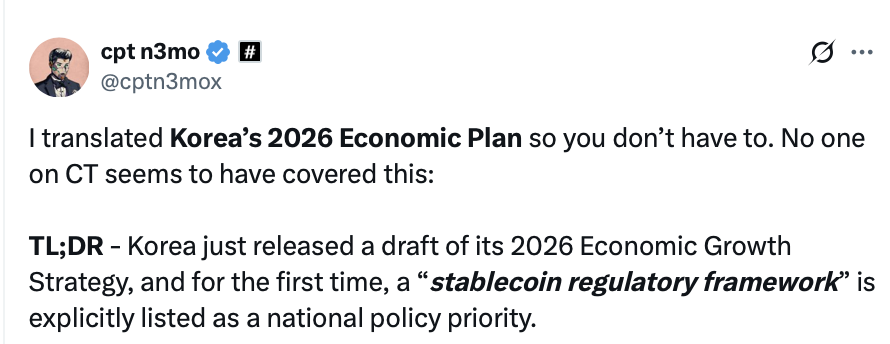Metaplanet to raise around $135M to stack more Bitcoin
Japan’s largest corporate Bitcoin holder, Metaplanet, plans to raise around $135 million to accumulate more BTC, even as the asset’s price continues to trade below $90,000.
The company is choosing to raise capital through issuing preferred shares instead of common stock, which seems to be largely to protect the stock price from tanking any further. Metaplanet’s share price has already plummeted nearly 60% in the past six months, now standing at 387 JPY (approximately $2.46 USD), according to Google Finance.
To avoid further volatility, the company will issue preferred shares with a 4.9% dividend instead of common shares, as per a statement published on Thursday.
Issuing common stock at this level would have potentially caused the stock to slide even further. The decision comes as its share price has recently slipped below its mNAV (multiple Net Asset Value), but that hasn’t fazed the company at all:
“Bitcoin is rapidly gaining strategic significance as a new store of value asset,” Metaplanet said. The mNAV is 1.01 at the time of publication.
The company is the fourth-largest Bitcoin treasury in the world, holding approximately 30,823 Bitcoin, according to data from BitcoinTreasuries.NET.
The fundraising plan comes as Bitcoin has entered a major correction, trading at around $87,000 just six weeks after reaching a new all-time high of $125,100, according to CoinMarketCap.
Metaplanet’s aggressive approach to buying Bitcoin is not without its critics. Crypto analyst Ted said in a recent X post that with the company “already underwater” securing Bitcoin-backed loans to buy more Bitcoin is a “bad idea.”
Meanwhile, Strategy, the largest Bitcoin public holder, has also seen its mNAV fall below 1, according to SaylorTracker.
Almost two-thirds of Singaporean retail investors now hold crypto: Survey
Crypto is winning over Singaporeans according to the latest survey from Coinbase and MoneyHero.
Nearly two-thirds of active retail investors in the country now hold some form of cryptocurrency, the survey results suggest. “61% of respondents reported holding crypto during the survey period, indicating that crypto participation has moved beyond niche but is becoming part of retail finance in Singapore,” the survey said.

However, not everyone is going full degen just yet. Most investors are sticking to modest allocations, with the average self-reported portfolio allocation sitting between 6% and 12%.
On the other hand, confidence in the asset class’s longevity appears strong, with 58% of respondents describing themselves as long-term holders.
Read also
Features
Crypto voters are already disrupting the 2024 election — and it’s set to continue
Features
Slumdog billionaire: Incredible rags-to-riches tale of Polygon’s Sandeep Nailwal
When it comes to learning about crypto, Singaporeans trust… Instagram?
Social media emerged as the primary entry point for crypto education, with 62% of respondents reporting that they learn about digital assets on social media platforms.
Singapore has long been recognized as a crypto-friendly hub. A May survey by crypto exchange Independent Reserve found that 94% of Singaporeans were aware of at least one type of cryptocurrency, and 29% currently own or have previously owned crypto.
South Korea’s stablecoin debate heats up as regulators eye non-bank issuers
South Korea’s top financial regulator is reportedly exploring whether tech giants should be allowed to issue won-denominated stablecoins.

Although the idea of the Financial Services Commission (FSC) greenlighting the concept is still in the early stages of discussion, it is already causing tension across the nation’s financial sector, a local media report said on Tuesday.
“Some are concerned that the entry of highly technologically advanced big tech and fintech companies into the stablecoin market could weaken banks’ competitiveness,” the report said.
Others in the banking industry say it is too early to start pulling their hair out over it. “Non-bank participation is still only at the discussion stage, so it’s hard to determine how it will affect market competition. We will prepare technical and regulatory responses once the framework becomes more concrete,” an unnamed commercial bank offical said.
Read also
Features
Will Robinhood’s tokenized stocks REALLY take over the world? Pros and cons
Features
Australia’s world-leading crypto laws are at the crossroads: The inside story
The five major South Korean banks, KB Kookmin Bank, Shinhan Bank, Hana Bank, Woori Bank, and NH NongHyup Bank, are all exploring and experimenting with stablecoins.
The news comes just a day after KRWQ, the first fiat-backed multichain stablecoin to the South Korean won (KRW), surpassed 1 billion won in trading volume (approximately $678,090 USD) in less than two weeks after its launch.
On a broader scale, crypto adoption in South Korea continues to increase. The country recorded the third-highest growth rate in the APAC region, doubling over the past 12 months, according to a September report from Chainalysis.
Naver to snap up South Korea’s top crypto exchange Upbit
South Korean search giant Naver is on the verge of acquiring the company behind the country’s largest crypto exchange, Upbit.
“Naver is said to be pushing for a comprehensive stock swap through its fintech subsidiary, Naver Financial, to make Dunamu a wholly owned subsidiary, a move aimed at expanding its business in the digital finance sector,” a local report said on Thursday.
The report explained that once both companies sign off on the proposal at their respective board meetings next week, the plan will then go to the shareholders for approval before the deal can be formally sealed.
Upbit is currently the largest crypto exchange in South Korea and the fourth-largest globally by trading volume.
Subscribe
The most engaging reads in blockchain. Delivered once a
week.


Ciaran Lyons
Ciaran Lyons is an Australian crypto journalist. He’s also a standup comedian and has been a radio and TV presenter on Triple J, SBS and The Project.
